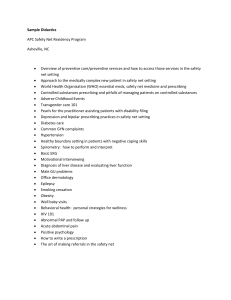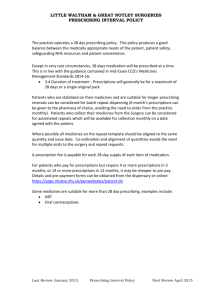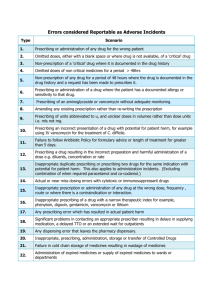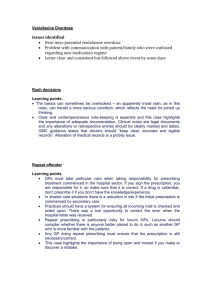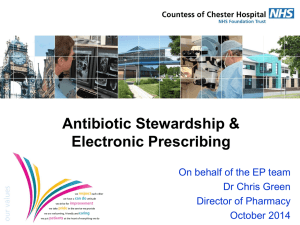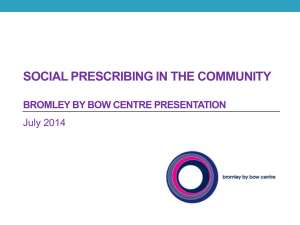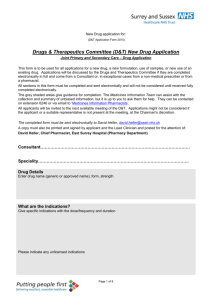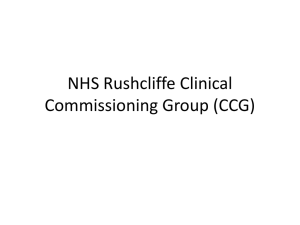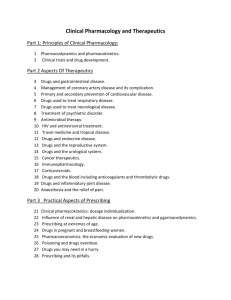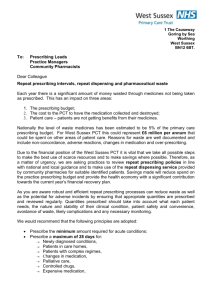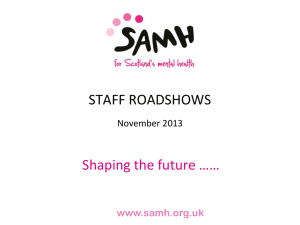SAMH`s position statement on medicines used in mental health
advertisement
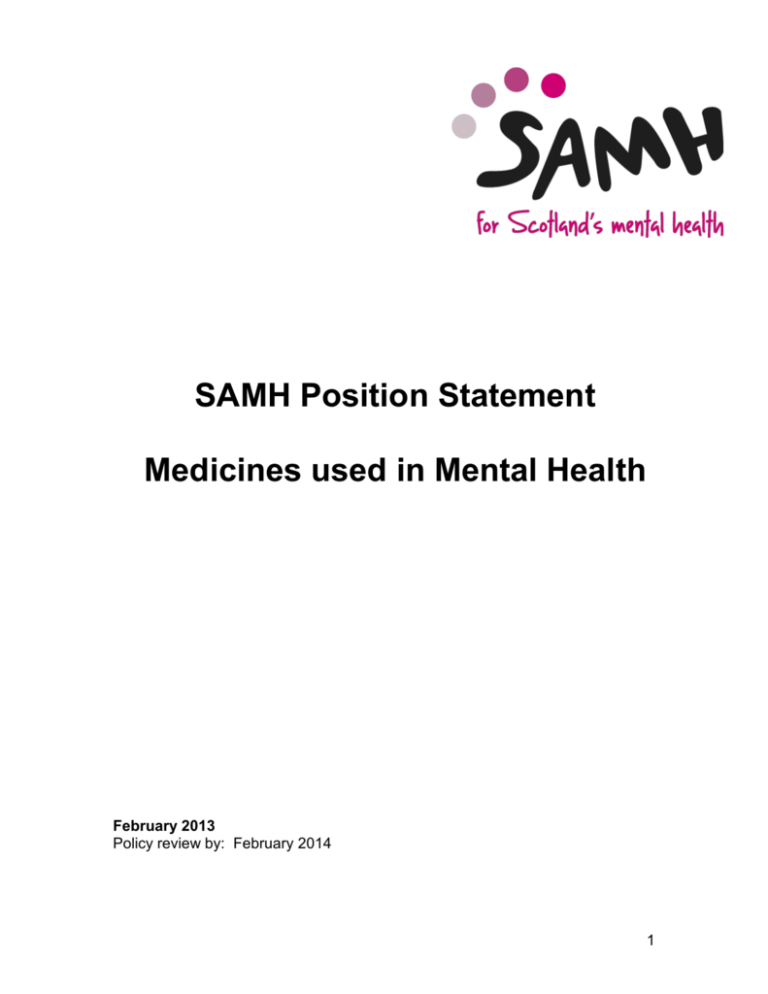
SAMH Position Statement Medicines used in Mental Health February 2013 Policy review by: February 2014 1 POSITION SUMMARY Psychiatric medication can be a vital and often successful element in the treatment of mental ill-health. Medications can also support and supplement many forms of non-medical therapy. People must have access to a range of treatments and be empowered to play an active role in deciding which medications are best suited to them and how they are used. The standards and guidelines which apply to prescribing in Scotland must be properly implemented and fully adhered to. The initial training and continuing professional development of GPs and Psychiatrists should be revised to include a stronger focus on prescribing for mental health STATEMENT OF THE ISSUE SAMH is frequently asked for views on psychiatric drugs, by mental health service users, carers, professionals, and by politicians and the media. It is clearly an issue which affects a great many people and which can polarise opinion. People’s experiences of the medicines used in mental health can vary greatly. Psychiatric drugs target mood and behaviour, meaning that their effects on individuals can be more unpredictable than their counterparts for physical illness, and finding the right drug can be largely a question of trial and error. For these reasons, it is vitally important that service users enjoy an open relationship with the person responsible for making the prescription. They should be treated as equal partners in the prescription process, with easy access to all the information they need to make informed choices. Furthermore, it is essential that the range of standards and guidelines relevant to prescribing in Scotland are properly promoted, understood and implemented. BACKGROUND It is rare for a psychiatric treatment not to have both enthusiasts and detractors. For over 50 years, drugs have been the mainstay of psychiatric treatment. Many people have found them to be helpful, even life-savers but others have had less positive experiences. Some argue that our treatment system is too dependent on drugs, as opposed to other treatments. Medicines used in mental health are usually prescribed by either Psychiatrists or GPs. Examples of psychiatric drugs currently being prescribed in Scotland include Antidepressants, Antipsychotics, and mood stabilisers. The most recent annual summary of prescribing statistics1 for mental health drugs shows increases in the prescribing rates for all groups of drugs over the previous 12 2 months. It is also estimated that 11.3% of the Scottish population aged 15 and over make daily use of antidepressant drugs.2 This may indicate an increasing reliance on psychiatric drugs and raise concerns about over-prescribing but it could also reflect the effective diagnosis and treatment of mental health conditions, in line with good clinical practice. A broad range of standards and guidelines have been introduced which are relevant to prescribing and treatment practice in Scotland. This includes guidance issued by the General Medical Council,3 which asserts that doctors must reach agreement with patients on the use of any proposed medication and treatment by exchanging information and clarifying concerns. The Scottish Intercollegiate Guidelines Network (SIGN) has developed a number of guidelines which outline prescribing and treatment options for a range of conditions, such as specific guidance on the non-pharmaceutical management of depression. NHS Boards in Scotland are also required to develop and implement Integrated Care Pathways (ICPs), clearly detailing the various interventions that must be offered to mental health service users, as well as those that must be offered to people with a specific condition. NICE guidelines are not specifically developed for use in Scotland but Scottish practitioners often take account of them because of their value as the latest, evidence based, clinical guidelines developed by experts in the relevant field. The NICE guideline for depression in adults specifically states that antidepressants should not be used to treat mild depression, instead recommending guided self-help, online CBT or group physical activity4. SAMH’s own research5 has consistently shown that a majority of people find medications to be useful in helping them to manage mental ill-health. However, this is not always the case and some people do not feel that they are afforded choice or given enough information about medications and the range of treatment options available to them. In addition, some people report experiencing unwanted side-effects but do not always feel that their concerns are taken seriously, whilst others believe that their use of medication is not adequately monitored and reviewed. Despite many positive developments in prescribing for mental health, it is clear that more remains to be done to improve the prescribing process and empower people to become active partners in decisions about which treatment options are best suited to them. If properly implemented, the various standards and guidelines which relate to prescribing could go far to bring about improvements in this regard. Recent changes to the way that GPs and Psychiatrists are appraised and validated also bring new opportunities to afford increased priority to good prescribing practice. 3 RECOMMENDATIONS SAMH is making the following recommendations to the Scottish Government, Local Authorities, National Health Service for Scotland (NHS), General Medical Council (GMC), Royal College of General Practitioners (RCGP), Royal College of Psychiatrists (RCPsych), NHS Education for Scotland (NES) and Healthcare Improvement Scotland (HIS): Prescribers should be able to demonstrate that patients’ views about medication and treatment are explored and their choices taken seriously at the point of prescribing. This could be investigated using patient experience surveys. HIS should develop a resource for prescribers to make it explicitly clear when a particular guideline or standard applies i.e. NICE, SIGN and/or ICP. Access to this information should then be demonstrated as part of appraisal and revalidation. The GMC, RCGP, RCPsych and HIS should strengthen training in prescribing. This should include reviewing the RCGP and RCPsych curriculum to give greater prominence to the knowledge and skills needed for safe prescribing. Greater attention should be given to prescribing for mental health in the continuing professional development of GPs and Psychiatrists. For example, new prescribing learning resources should be promoted to doctors as part of the Continuing Professional Development modular Credit-Based System. The GMC, RCGP and RCPsych should enable prescribers to record educational activities, audits, and procedures specifically relating to prescribing. This should then be reviewed during Appraisal to identify areas for improvement. The GMC, RCGP, RCPsych and HIS should ensure that prescribers regularly review their repeat prescribing and medication monitoring procedures, and can demonstrate the outcomes of these reviews. 1 Information Services Division, Prescribing & Medicines: Medicines for Mental Health Financial Years 2002/03 to 2011/12, 25 September 2012 2 Publication Summary Prescribing & Medicines: Medicines used in Mental Health Financial years 2001/02 – 2010/11, Information Services Division , September 2011 4 3 General Medical Council, Good practice in prescribing medicines - guidance for doctors, 2008 4 NICE, CG90, Depression in adults: the treatment and management of depression in adults, 2009 5 SAMH, All You Need To Know (2003) & What’s The Script (2013) 5
